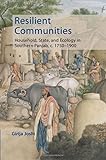Resilient communities: Household, state, and ecology in Southern Panjab, c.1750–1900
Material type: TextPublication details: United Kingdom Cambridge University Press 2025Description: 301 pISBN:
TextPublication details: United Kingdom Cambridge University Press 2025Description: 301 pISBN: - 9781009512510
- PB 954.502 JOS
| Item type | Current library | Call number | Status | Date due | Barcode | Item holds |
|---|---|---|---|---|---|---|
|
|
Gandhi Smriti Library | PB 954.502 JOS (Browse shelf(Opens below)) | Available | 179935 |
This book offers a historical perspective on the relationship between community, subsistence, and governance in north-western India. Focusing on Panjab, it explores the continuities in kinship and caste practices of rural Panjabi populations from the mid-eighteenth to late nineteenth centuries. Working from the household outwards, it studies how agropastoral lineages formed, and how some of these managed during the eighteenth century to establish autonomous states or riyasats of their own. From the early nineteenth century onwards, this riyasati order was systematically dismantled by the colonial state. Nevertheless, this book suggests that colonial attempts to settle and reform rural society, by changing both its relationship to the environment and by imposing new definitions of 'community' upon it were met with uneven success. Colonial subjects in rural Panjab continued to forge bonds of kinship beyond the legal limits imposed by the state.


There are no comments on this title.